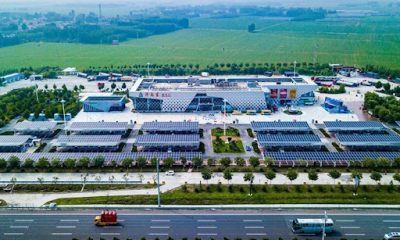News
System for safeguarding Chinese people’s living standards further improved
By Yang Hao, People’s Daily
By rolling out a series of policies in the interests of the people and providing them with assistance subsidies, the Chinese government has built a closely knit network for guaranteeing people’s well-being.
In 2014, China’s State Council issued Interim Measures for Social Assistance, which created a full-fledged social assistance system; in 2020, a directive on reforming and perfecting the system was rolled out.
Last year, the annual assistance subsidies allocated to people in need by the central government rose to 147.6 billion yuan ($22.2 billion); and the average subsistence allowance in urban and rural areas across the country grew to 711 yuan and 530 yuan per person per month, respectively, compared with 330 yuan and 172 yuan per person per month in 2012.
China has endeavored to make social assistance more effective. As a tiered and classified social assistance system is gradually built and improved in the country, mechanisms concerning basic living assistance, social assistance for special purposes and temporary assistance in emergencies and disasters have matured.
The country’s subsistence allowance system makes sure that all people with serious illness or severe disabilities and other people eligible for the government’s subsistence allowance can enjoy the allowance.
To ensure that all people in extreme poverty can receive assistance and support from the government, the country’s scheme for assistance and support for severely impoverished people integrates assistance for urban residents without income, the ability to work, or support by family and rural residents eligible for the “Five Guarantees” (food, clothing, medical care, housing, education for orphans or funeral expenses): those who are unable to work and have no source of income, including the elderly, the disabled and minors who have no legal guardians to support them, and regulates the identification of people in extreme difficulty.
The mechanism for temporary assistance makes good use of petty cash of townships and subdistricts for emergency assistance, thus solving the sudden, urgent and temporary difficulties of people in a timely manner.
China has consolidated the fruits of poverty alleviation to guarantee people’s basic living standards.
The Ministry of Civil Affairs (MCA) has introduced measures to strengthen the complementarity of rural subsistence allowance system and poverty alleviation and development policies to solidify the foundations for the social security system for years.
Since the end of 2017, the standards of eligibility for rural subsistence allowances in all Chinese county-level regions have consistently reached or exceeded the national poverty line.
As of the end of 2020, 19.36 million registered impoverished people in China had been covered by the country’s social assistance system, which accounted for 19.6 percent of the population lifted out of poverty in the country.
The MCA has guided regions in improving the system for actively discovering people in straitened circumstances and achieving more accurate identification of the group so that people in need can receive timely assistance.
Lichuan county, Fuzhou city, east China’s Jiangxi province, has ensured precise identification of people in need of social assistance through grid-based management. It has built a three-tiered grid-based database for these people, which includes 561 grids.
Dezhou city, east China’s Shandong province, has established a mechanism for the dynamic monitoring of low-income population and gained a panoramic portrait of the economic situation of each household. Besides, the city has incorporated 42 relief policies and some welfare policies originally handled by 15 functional departments into one platform. By employing data, the city has provided targeted assistance for over 1.18 million people.
Social assistance has effectively made people’s life easier. Ma Jifei, a farmer in Hongsibao district, Wuzhong city, northwest China’s Ningxia Hui autonomous region, tried applying for subsistence allowance for his sick father after he lost sources of income due to the COVID-19 pandemic and had trouble affording medical care for his father. According to Ma, the application was quickly approved.
In an effort to help urban and rural residents who are struck by the pandemic and disasters and thus face troubles with basic living, local civil affairs authorities have adjusted promptly and introduced many social assistance policies and measures, expanding the coverage of subsistence allowance and temporary assistance and providing one-time temporary relief funds for uninsured and unemployed persons that can’t guarantee minimum living standards.
Guided by these policies and measures, governments of areas hit by emergencies and disasters provide temporary assistance in a timely manner for migrants without local household registration status who face severe difficulties with basic living.
These policies and measures also stress enhancing visit to and care services for people amid the pandemic and arranging personnel to provide timely care and assistance for special groups, including the elderly, people with disabilities, and children, in the homes of COVID-19 patients who are being isolated and treated.
As China’s network for safeguarding people’s living standards becomes increasingly tight, the country is bound to achieve even greater results in guaranteeing people’s well-being.
News
TCN Acknowledges 7th Grid Collapse in 2024

The Transmission Company of Nigeria (TCN) has reported its seventh partial grid collapse in 2024. Despite the recurring issue, TCN’s General Manager of Public Affairs, Ndidi Mbah, reassured the public that efforts to restore power are well underway, with about 90% of substations receiving bulk power.
Mbah noted that the Azura Power Station initiated the grid recovery, although a minor setback occurred. However, power supply has been restored to the Abuja region and other key distribution centers. The Ibom Gas Generating Station remained unaffected, continuing to supply power to the South-South region.
An investigation into the cause of the collapse will commence once full grid restoration is achieved.
News
Jigawa Tanker Tragedy: Shettima, First Lady Mourn Victims, Pledge Federal Support

Vice President Kashim Shettima has expressed deep sorrow over the tragic tanker explosion in Jigawa State, which claimed over 100 lives. In a statement issued by his media aide, Stanley Nkwocha, Shettima, on behalf of President Bola Tinubu, extended condolences to the affected families, praying for strength and comfort in their time of grief.
Shettima assured the public that the federal government is mobilizing resources to support the injured and assist those affected. He has directed the immediate deployment of the National Emergency Management Agency (NEMA) to provide aid. The Vice President also stressed the need for a review of fuel transportation safety protocols to prevent future incidents.
In a separate statement, First Lady Oluremi Tinubu offered her condolences to Jigawa Governor Umar Namadi and the people of Jigawa, praying for peace and comfort for the families affected. She called the incident “unfortunate” and extended prayers for the recovery of the injured and the repose of the souls lost in the tragedy.
News
Nigeria Customs Intercepts Arms, Ammunition Worth N9.5bn Over Six Years

The Nigeria Customs Service (NCS) has revealed that it intercepted a total of 10,598 pieces of arms and 114,929 rounds of ammunition valued at N9.58 billion over the past six years. Comptroller General of Customs, Bashir Adewale Adeniyi, made this disclosure during a press conference on enforcement activities in Zone A.
Adeniyi highlighted that 60% of these seizures occurred in 2023, reflecting the Customs’ increased efforts to curb arms smuggling. He also mentioned that recent operations such as Operation Whirlwind and Operation Swift Sting are part of a strategic response to tackle evolving smuggling tactics.
In addition to arms seizures, the Customs CG announced the largest pangolin scale seizure since 2020, with 9,493 kg of scales confiscated in collaboration with the Wildlife Justice Commission. The joint operation led to four arrests across Kano, Kaduna, and Lagos. The NCS continues to intensify efforts against wildlife trafficking, targeting supply routes in northern Nigeria and border areas.
-

 Business14 hours ago
Business14 hours agoOkpella Monarch: Obaseki Ratified Kingmakers Decision, End 5years leadership Vacuum
-

 Banking10 hours ago
Banking10 hours agoFree Food Saga: Akpabio quoted out of context-CSO
-

 Foreign15 hours ago
Foreign15 hours agoSci-tech innovation fuels China’s high-quality development
-

 Entertainment7 hours ago
Entertainment7 hours agoDavido Declares ‘Timeless’ His Best Album
-

 Entertainment7 hours ago
Entertainment7 hours ago‘Adire’ Secures Four Nominations at the Best of Nollywood Awards
-

 Business7 hours ago
Business7 hours agoWike Urges Nigerians to Pay Taxes for Improved Social Services
-

 Foreign9 hours ago
Foreign9 hours agoQinling Mountains better safeguarded with comprehensive digital platform
-

 Foreign9 hours ago
Foreign9 hours agoExpressway service station in Shandong achieves carbon neutrality






